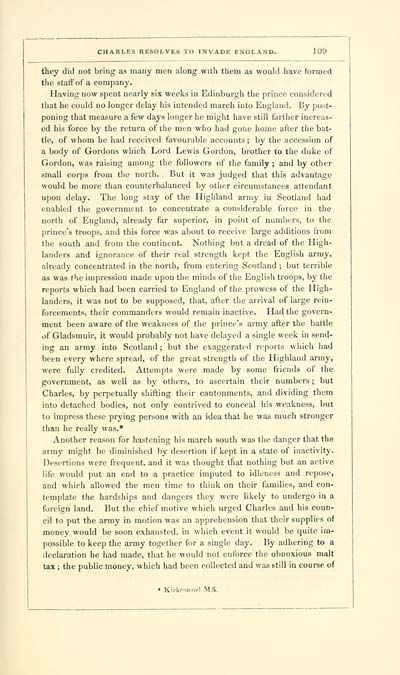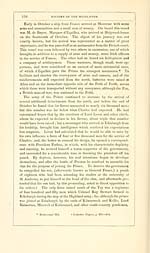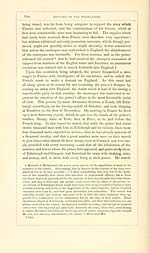Download files
Complete book:
Individual page:
Thumbnail gallery: Grid view | List view

CHARLES RESOLVEii TO INVADE ENGLAND. 109
they did not bring as many men along witli them as would have formed
the staff of a company.
Having now spent nearly sis weeks in Edinburgh the prince considered
tliat he could no longer delay his intended march into England. I5y post-
poning that measure a few days longer he niiglit have still farther increas-
ed his force by the return of the men who had gone home after the bat-
tle, of whom he had received tiivourable accounts ; by the accession of
a body of Gordons which Lord Lewis Gordon, brother to the duke of
Gordon, was raising among the followers of the family ; and by other
small corps from the north. But it was judged that this advantage
would be more than counterbalanced by other circumstances attendant
upon delay. The long stay of the Highland army in Scotland had
enabled the government to concentrate a considerable force in the
north of England, already far superior, in point of numbers, to the
prince's troops, and this force was about to receive large additions liom
the south and from the continent. Nothing but a dread of the High-
landers and ignorance of their real strength kept the English army,
already concentrated in the north, from entering Scotland ; but terrible
as was the impression made upon the minds of the English troops, by the
reports which had been carried to England of the prowess of the High-
landers, it was not to be supposed, that, after the arrival of large rein-
forcements, their commanders would remain inactive. Had the govern-
ment been aware of the weakness of the prince's army after the battle
of Gladsmuir, it would probably not have delayed a single week in send-
ing an army into Scotland ; but the exaggerated reports which had
been every where spread, of the great strength of the Highland army,
were fully credited. Attempts were made by some friends of the
government, as well as by others, to ascertain their numbers ; but
Charles, by perpetually shifting their cantonments, and dividing them
into detached bodies, not only contrived to conceal his weakness, but
to impress these prying persons with an idea that he was much stronger
than he really was.*
Another reason for hastening his march south was the danger that the
army might be diminished by desertion if kept in a state of inactivity.
Desertions were frequent, and it was thought that nothing but an active
life would put an end to a practice imputed to idleness and repose,
and which allowed the men time to think on their families, and con-
template the hardships and dangers they were likely to undergo in a
foreign land. But the chief motive which urged Charles and his coun-
cil to put the army in motion was an apprehension that their supplies of
money would be soon exhausted, in which event it would be quite im-
possible to keep the army together for a single day. By adhering to a
declaration he had made, that he would not enforce the obnoxious malt
tax ; the public money, which had been collected and was still in course of
• Kirkfoniipl M.S.
they did not bring as many men along witli them as would have formed
the staff of a company.
Having now spent nearly sis weeks in Edinburgh the prince considered
tliat he could no longer delay his intended march into England. I5y post-
poning that measure a few days longer he niiglit have still farther increas-
ed his force by the return of the men who had gone home after the bat-
tle, of whom he had received tiivourable accounts ; by the accession of
a body of Gordons which Lord Lewis Gordon, brother to the duke of
Gordon, was raising among the followers of the family ; and by other
small corps from the north. But it was judged that this advantage
would be more than counterbalanced by other circumstances attendant
upon delay. The long stay of the Highland army in Scotland had
enabled the government to concentrate a considerable force in the
north of England, already far superior, in point of numbers, to the
prince's troops, and this force was about to receive large additions liom
the south and from the continent. Nothing but a dread of the High-
landers and ignorance of their real strength kept the English army,
already concentrated in the north, from entering Scotland ; but terrible
as was the impression made upon the minds of the English troops, by the
reports which had been carried to England of the prowess of the High-
landers, it was not to be supposed, that, after the arrival of large rein-
forcements, their commanders would remain inactive. Had the govern-
ment been aware of the weakness of the prince's army after the battle
of Gladsmuir, it would probably not have delayed a single week in send-
ing an army into Scotland ; but the exaggerated reports which had
been every where spread, of the great strength of the Highland army,
were fully credited. Attempts were made by some friends of the
government, as well as by others, to ascertain their numbers ; but
Charles, by perpetually shifting their cantonments, and dividing them
into detached bodies, not only contrived to conceal his weakness, but
to impress these prying persons with an idea that he was much stronger
than he really was.*
Another reason for hastening his march south was the danger that the
army might be diminished by desertion if kept in a state of inactivity.
Desertions were frequent, and it was thought that nothing but an active
life would put an end to a practice imputed to idleness and repose,
and which allowed the men time to think on their families, and con-
template the hardships and dangers they were likely to undergo in a
foreign land. But the chief motive which urged Charles and his coun-
cil to put the army in motion was an apprehension that their supplies of
money would be soon exhausted, in which event it would be quite im-
possible to keep the army together for a single day. By adhering to a
declaration he had made, that he would not enforce the obnoxious malt
tax ; the public money, which had been collected and was still in course of
• Kirkfoniipl M.S.
Set display mode to: Large image | Transcription
Images and transcriptions on this page, including medium image downloads, may be used under the Creative Commons Attribution 4.0 International Licence unless otherwise stated. ![]()
| Early Gaelic Book Collections > Ossian Collection > History of the Highlands and of the Highland clans > Volume 3 > (139) |
|---|
| Permanent URL | https://digital.nls.uk/79654090 |
|---|
| Description | Vol. III. |
|---|---|
| Shelfmark | Oss.249 |
| Attribution and copyright: |
|
| Description | Selected books from the Ossian Collection of 327 volumes, originally assembled by J. Norman Methven of Perth. Different editions and translations of James MacPherson's epic poem 'Ossian', some with a map of the 'Kingdom of Connor'. Also secondary material relating to Ossianic poetry and the Ossian controversy. |
|---|
| Description | Selected items from five 'Special and Named Printed Collections'. Includes books in Gaelic and other Celtic languages, works about the Gaels, their languages, literature, culture and history. |
|---|

